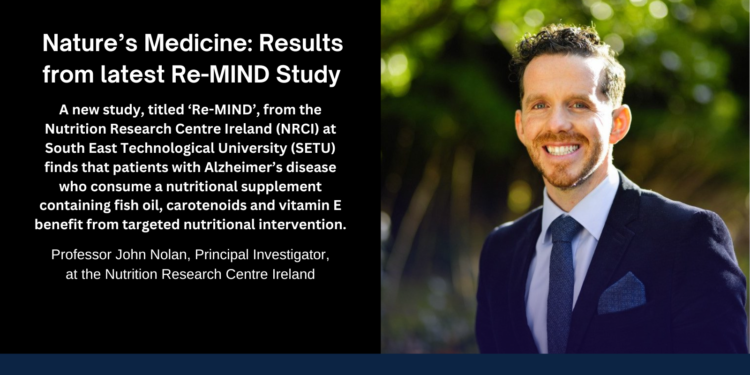Professor John Nolan, Principal Investigator, at the Nutrition Research Centre Ireland
A new study, titled ‘Re-MIND’, from the Nutrition Research Centre Ireland (NRCI) at South East Technological University (SETU) finds that patients with Alzheimer’s disease who consume a nutritional supplement containing fish oil, carotenoids and vitamin E benefit from targeted nutritional intervention
The authors conclude that this supplement formulation should be considered in the overall management of Alzheimer’s disease. The clinical trial was led by Professor John Nolan and Dr Rebecca Power of the NRCI at SETU along with Professor Ríona Mulcahy, Consultant Physician in General and Geriatric Medicine at University Hospital Waterford, along with many other expert colleagues. Professor Nolan is Principal Investigator, at the Nutrition Research Centre.
Explaining a bit of his background leading up to this ground-breaking trial, he told Irish Pharmacy News “My work in this field really began 24 years ago when I started to look at the connection between eye health and nutrition. Specifically within the field of Age-Related Macular Degeneration. “I discovered that there are certain nutrients called carotenoids, which affect eye health and embarked on a number of trials and further research. Hence, these nutrients are now known as the gold standard in eye care. “The idea is simple. People who are at risk of AMD have deficiencies in three carotenoids (natural plantbased pigments found in fruits & veg), especially meso-zeaxanthin, the central macular pigment. These pigments act as a protective layer, filtering out harmful blue light and reducing oxidative damage at the back of the eye.
What we’ve discovered is how to rebuild these pigments and by doing so, we can improve vision. “We’ve learned that the three carotenoids – lutein, zeaxanthin, and meso-zeaxanthin – which form the macular pigment in the eye also play a role in the brain by improving cognitive function, likely due to their antioxidant and antiinflammatory properties. It’s very exciting in terms of what we can do with the right nutrition” Re-MIND (Memory Investigation with Nutrition for Dementia), a follow-on from a breakthrough study published by the NRCI in 2018, was a double-blind, placebo-controlled, clinical trial researching patients with mild to moderate stage Alzheimer’s disease.
Individuals consuming the nutritional supplement demonstrated statistically significant increases in their blood concentrations of carotenoids (plant-based pigments that give fruits and vegetables their colours), omega-3 fatty acids (the building blocks of our cells), and vitamin E (one of four essential fat-soluble vitamins) after 12 months in comparison to patients receiving a placebo. The main outcomes of the trial included slower rates of disease progression, and greater improvements in mood and memory (as reported by the carers) of patients receiving the active intervention. Professor Nolan adds, “The many scientific discoveries over the last two decades have led us to this point.
Our earlier published studies clearly demonstrated that carotenoids are related to cognitive function in the general population across all ages. When combined with omega-3 fish oil we see improved response of the carotenoids in blood, and improvements in cognitive function can be achieved with supplementation of these nutrients. “Then, we observed that these positive effects can also be achieved in individuals with mild cognitive impairment. In 2014, we reported that patients with Alzheimer’s disease have very low levels of carotenoids compared to aged matched controls, so the results of the Re-MIND trial are compelling when all the evidence is considered.”
So what is so unique about this nutritional supplement? Professor Nolan tells us, “Really the innovation behind this is the synergistic effect, the combination of these particular nutrients and discovering the synergy of using them together. Now, for the first time, patients and their carers can access this treatment in real time. “It is important therefore, as we move on from the results of this study, that patients have access to this nutritional supplement.
It must be pointed out that we can’t leave these patients to operate under their own devices so community pharmacists will play a huge role in helping to get the information out there and to support their customers in making the right management decisions.
“Furthermore, we really need to see major investment in this sector. We need to stop trying to find the ‘silver bullet’ but realise that a change in lifestyle in a way that is meaningful, is the way forward.
“This nutritional supplement is available now, pharmacists should be engaging with the customers and informing them as to its availability and the difference it can make to quality of life. It really is nature’s medicine.”









